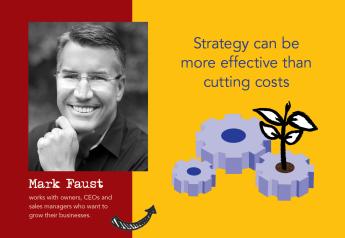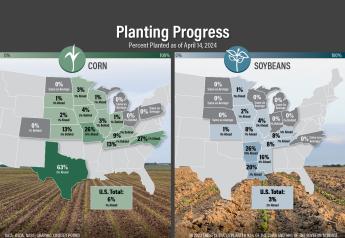A Historical Day: SCOTUS Hears Oral Arguments on Proposition 12

Operating with the constant backdrop of uncertainty of new and pending legislation makes it difficult to run any business, let alone a farm, says National Pork Producers Council (NPPC) president Terry Wolters, a Minnesota pork producer.
He was one of a handful of pork producers who watched Supreme Court justices grill attorneys with questions during oral arguments on Oct. 11 in NPPC v. Ross brought forward by the American Farm Bureau Federation and NPPC challenging the constitutionality of California Proposition 12.
“Proposition 12 is not good for my animals. It's not good for the consumers. And it's definitely a challenge for the future of farming,” Wolters said during a media briefing following oral arguments. “When I'm on the farm in the Midwest, it seems like Washington, DC, can be a long way away. It's fascinating today to watch the two worlds come together on an issue so significant to our industry.”
From animal welfare and worker safety to food affordability and producer livelihoods, Wolters said Proposition 12 threatens the pork industry. One state should not be able to regulate commerce in another state and set arbitrary standards that lack any scientific, technical or agricultural basis, NPPC said in a statement.
“We've worked long and hard to be able to proudly tell the story of the U.S. pig farmer to the Supreme Court. And today was the day...a very remarkable day,” Wolters said.
Michael Formica, NPPC chief legal strategist, agreed it was a good day in court. He said he felt hopeful to hear the justices understand the trouble that will be created by laws like Proposition 12 that reach far outside of the state’s borders and try and impose the moral wills of one state on farmers, or in this case, on any business or operation that’s located entirely in other states.
“It has a tremendous impact on pork production and pork prices. But if let stand, it would have a tremendous impact on the U.S. economy and on the flow of commerce across borders,” Formica said.
Competing Morals
The concept of “moral will” was mentioned often throughout the oral arguments. Formica said different states having different competing morals will always be a risk.
“Some of the California voters voted for this, but we have pork producers here on our board and other pork producers in the courtroom today, who every day wake up with a moral imperative to care for their animals, to raise those animals in a sustainable fashion and then ultimately to produce food that feeds everyone and in a fashion that everyone can afford to eat it,” Formica said.
The justices pointed out that farmers’ morals command them to take care of the animals and to produce food. So, what happens when one state comes up with a decision that they determine is the best way to care for animals?
“What happens when Ohio convenes all of its experts and they come up with a decision that they determine is the best way to raise animals in Ohio? Does California have the right to usurp the legislative and regulatory authority of Ohio within the state of Ohio?” Formica asked. “I don't think the Constitution allows it. I think we heard from justices that they're very troubled by that notion.”
At the end of the day, NPPC and AFBF support pork producers raising pigs in a way that’s best for them and their operation. For example, Scott Hays, NPPC president elect and a pig farmer from Missouri, says gestation crates work best on his farm.
“Sows are bullies. They fight. They assert their dominance. Housing animals in individual pens where they can be fed and watered and cared for individually is a very humane way of housing them,” Hays said.
Formica said one of his concerns is the changing nature of ballot initiatives.
“If a farmer were to go and change their operation to comply with (California) Proposition 12, what is there to stop New York from turning around in two years and say it's not 24 square feet, it’s got to be 26 square feet? And then, two years after that, California goes back and says let’s make it 30 square feet,” Formica said. “If there's really market demand, we've got this thing called the free market in this country and it's amazing. If there's demand, supply will follow.”
Producer Perspectives
For Lori Stevermer, NPPC vice president and a pig farmer from Minnesota, being able to sit in the courtroom to hear oral arguments was exciting and reaffirms the Constitution is on pork producers’ side.
“It also made me very happy to be part of both NPPC and AFBF. These organizations are working on my behalf for important issues like this. As a smaller farmer, I can't do it myself. But to see what they're doing and hearing the case they brought forward, it was just very exciting and very positive,” Stevermer said.
There’s no doubt this once-in-a-lifetime opportunity will long be remembered by Hays, too.
“The exchange with the judges and the lawyers was interesting. I enjoyed their comments and the depth of knowledge of what's at stake here,” Hays said. “I felt like they were really trying to understand and come up with a decision that is best for all Americans. That's going to be a high-quality, low-cost protein source for everyone, not imposing one group's opinion on the rest of us.”
Stevermer said pig farmers have always been good at responding to market demands, utilizing new technology and listening to advice from veterinarians and consultants.
“We continue to evolve and learn from each other,” she said. “I don't see that changing. That's what makes us a great industry and such a low-cost producer. Consumers send us the signals, then we use the technology and expertise available to us to make the right decision for our farms and our animals.”
A Life-Changing Case
Even though Stevermer doesn’t own sows, she says the outcome of today has a major impact on her life.
“If the cost to implement in California is great as we expect it will be, or if the market is cut off, it’s very possible the people we raise pigs for will say, ‘we don’t need your farm anymore because we don’t have any place to sell our pork.’ And that takes us out of the business,” Stevermer said. “It’s a life-changing case for many of us – not just me.”
To that point, Wolters added there's a large financial investment decision that's going to have to be made for owners of sow farms.
“In today's inflationary period and with the availability of supplies, every producer is going to have to sort that out individually whether they can financially move forward with the new model,” Wolters said.
A ruling is due by the end of June, Reuters reports.
SCOTUS Zeroes in on Key Proposition 12 Issues
More from Farm Journal's PORK:
Follow California Proposition 12 SCOTUS Oral Arguments Live
Proposition 12 is Not the Way We Want to Care for Animals, Hays Says
How Prop 12 Could Impact Crop and Livestock Producers
Proposition 12 Will Push Pig Farmers Out of Business, NPPC and Farmers Say
Ironic Timing: NPPC, AFBF File Reply Brief on Prop 12, CDFA Finalizes Rules
Proposition 12 Compliancy: Don't Do It for Free, Hollis Says
Why Agriculture Can't Ignore Proposition 12 and Question 3







